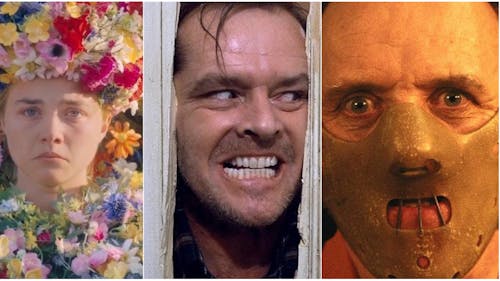OLIVER: Quality horror movies are found in psychological thrillers
Column: Curiosity Corner

With Halloween rapidly approaching, the season to indulge in the most thrilling and captivating genre of cinema is upon us. But the most challenging aspect of this pursuit invariably resides in the quest for the perfect horror movie.
As filming techniques and equipment have evolved over the decades, the distinction between horror movies of today and those from 50 years ago has become strikingly apparent. While special effects and editing techniques have markedly improved, the most notable difference comes from the fact that modern horror movies are simply more profoundly terrifying.
Horror as a genre has long been a fundamental component of the cinematic landscape, consistently captivating audiences with tales of the supernatural, enigmatic and macabre. While the primary objective of the genre has always been to provoke fear and suspense, it has significantly evolved over the years, embracing a darker, more visceral side. The ascension of gore within horror serves as a testament to filmmakers' unwavering commitment to relentlessly pushing the boundaries of terror.
A notable contributor to the increasing prevalence of gore in horror films is a growing desensitization to violence among audiences. What was once deemed shocking and gruesome no longer holds the same impact on contemporary viewers. As audiences have grown more accustomed to violent content, filmmakers frequently find themselves engaged in a competitive pursuit to unnerve and disturb their audiences.
Moreover, cultural and societal dynamics play a pivotal role in this evolution. When audiences appear to be unaffected by on-screen violence, it seems that horror movies tend to react by becoming increasingly extreme. These films serve as unsettling reflections of some of the most profound anxieties and darkest facets of our collective psyche.
In our present-day consumer-driven society, there exists a persistent demand for fresh and stimulating experiences. Horror movies, much like other forms of entertainment, cater to this demand by continually pushing the boundaries of gore and violence to capture the audience's attention.
It is an irrefutable fact that sensationalism sells. The quest for profit often compels filmmakers and studios to generate content that will seize the public's attention and, in the process, yield revenue. But an undue emphasis on violence and gore can be misdirected. The films that have consistently withstood the test of time are often those that harness alternative factors to their advantage.
Classic horror films like "The Silence of the Lambs" and "The Shining" as well as more contemporary releases like "Midsommar" employ psychological horror to truly terrify their audiences. Ultimately, what renders psychological horror more disquieting than its gory counterpart is its unique capacity to delve into the profound recesses of the human psyche, evoking personal and intellectual responses and leaving a lasting and lingering sense of dread.
The very essence of psychological horror's ability to send shivers down the spine and haunt the mind is rooted in its mastery of subtlety, suggestion and suspense. Diverging from its graphic sibling, psychological horror relies less on visceral and gory displays of horror. Instead, it engages the audience's imagination, crafting a disconcerting atmosphere in which the true horror largely resides within the viewer's own mind.
The fear instigated by psychological horror is characterized by its intellectual and existential nature. It delves into universal apprehensions such as the fear of the unknown, the fear of losing one's sanity and the fear of doubting one's own senses. These are fears capable of gripping the viewer on a deeply personal level, eliciting a visceral response that transcends the confines of the screen.
While gore may elicit a momentary visceral reaction, it tends to fade swiftly. Conversely, subtlety and ambiguity constitute the primary tools of psychological horror. It thrives on uncertainty, often resisting the provision of clear answers or explanations for the horrors it unveils.
This ambiguity leaves viewers questioning the very essence of the threats, the reliability of their own perceptions and the nature of reality itself. In this uncertainty, fear thrives and endures long after the credits roll.
Though gore indisputably maintains its place in the pantheon of horror, psychological horror offers a distinct, profound and nuanced form of terror. It is a genre that ventures into the darkest facets of the human experience, delving into universal fears and anxieties with subtlety and intellectual depth.
When the time comes to select your next horror film for this Halloween season, consider taking a plunge into the realm of psychological horror if a genuine scare is what you seek.
Jamie Oliver is a sophomore in the School of Arts and Sciences majoring in cognitive science and linguistics. Her column, "Curiosity Corner," runs on alternate Sundays.
*Columns, cartoons and letters do not necessarily reflect the views of the Targum Publishing Company or its staff.
YOUR VOICE | The Daily Targum welcomes submissions from all readers. Due to space limitations in our print newspaper, letters to the editor must not exceed 900 words. Guest columns and commentaries must be between 700 and 900 words. All authors must include their name, phone number, class year and college affiliation or department to be considered for publication. Please submit via email to oped@dailytargum.com by 4 p.m. to be considered for the following day's publication. Columns, cartoons and letters do not necessarily reflect the views of the Targum Publishing Company or its staff.



